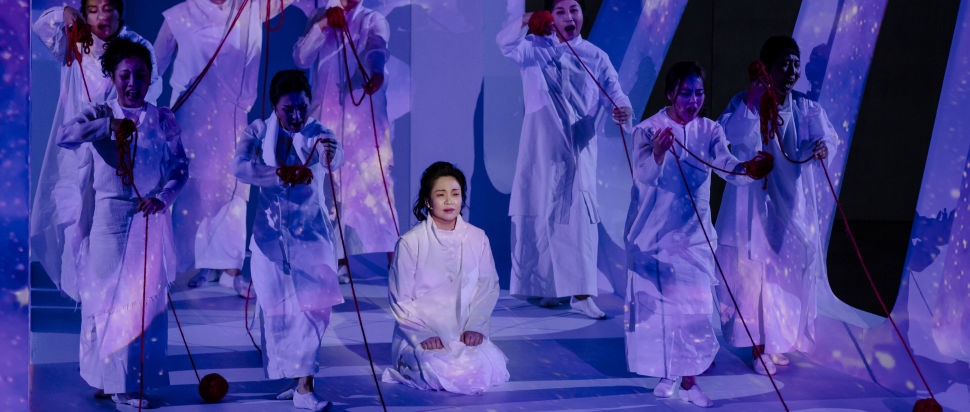EIF: Trojan Women @ Festival Theatre
This Korean adaptation of Euripides' classic play is a sweeping epic that showcases pansori
Trojan Women, adapted from Euripides' classical script by Bae Sam-sik, is a bold and sweeping opera worthy of its epic origins. Ahn Sook-Sun's pansori compositions showcase the Korean language at its most evocative. To me, pansori is the sound the heart is supposed to make – it is a visceral, embodied vocal art. As Hecuba, Kim Kum-mi anchors the production; the complexities of the character are impeccably expressed. Yi So-yeon (Cassandra) is another standout. Her performance is riveting and deeply evocative, and her vocal control is on full display in the role. However, the star of the show is the chorus of eight women (Heo Ae-sun, Na Yoon-young, Seo Jung-kum, Lee Youn-joo, Min Eun-kyung, Cho Yu-ah, Wang Yun-jeong, Kim Woo-jeong), who boldly articulate the sounds of grief.
On a larger scale, Ong Keng Sen's direction leads the piece to well-coordinated resonance – Ong's version of Troy is incredibly rich. The stark white set, along with the women's plain, white robes (the colour of mourning), often roils with projected imagery. Video design by Austin Switser underscores the action of the opera, bolstering emotional mimesis with visual abstraction. At times, the reference is literal – video flames are flames in the story – but at other points, the projections help us travel to where the minds of the characters are going.
In an interview with The Skinny this month, Ong referenced the "psychic translations" between the text of Euripides' Trojan Women and struggles known to Korean women today. The depiction of class stratification throughout Trojan Women highlights the same detail, however distantly, about the story of the comfort women. Throughout the text, we are met with dual, even competing, narratives: while Hecuba is concerned for her country and her bloodline, the other women count the fall of Troy as just one more of a never-ending series of traumas.
Kim Jun-soo makes a brief but captivating appearance as Helen. His face is made up in an interpretation of mainstream Korean makeup – face nearly white, lips blotted and rosy. In a ballad that traverses pansori and pop, Kim paints a heartbreaking picture of beauty, chauvinism, and victim-blaming. Kim's depiction of Helen asks a bold (but never heavy-handed) question about who constructs, owns, and polices femininity.
Trojan Women is a truly ambitious production on an epic scale. In addition to the impressive size of the production (literally and figuratively), the opera showcases pansori as a precious cultural art form.
Trojan Women, Festival Theatre, 10 & 11 Aug, 7.30pm, £20-47
